Miercoles
Eventos economicos
Solicitudes de hipotecas
Comercio Internacional
Reporte del petroleo
Subasta de bonos
Minutas del Fed
Bank Reserve Settlement
MBA Purchase Applications
7:00 AM ET
International Trade
8:30 AM ET
Wholesale Trade
10:00 AM ET
EIA Petroleum Status Report
10:30 AM ET
10-Yr Note Auction
1:00 PM ET
FOMC Minutes
2:00 PM ET
Miercoles 11/07/12 Minutas del Fed
Re: Miercoles 11/07/12 Minutas del Fed
Las Minutas del Fed nos daran mas luz acerca del estado de la economia en las regiones de US. Hemos visto deterioracion en el mercado laboral, la manufactura flaqueando, los bienes raices tocando piso en algunas regiones, los PMIs debiles tambien. Veremos que es lo que hara el Fed, estan listos para actuar, cuando actuaran y de que manera? el mercado esta esperando otro QE3 si las cosas no mejoran. Estamos ya en Julio, empezando el segundo semestre y solo quedan algo mas de 3 meses para las elecciones presidenciales.
- admin
- Site Admin
- Mensajes: 165559
- Registrado: Mié Abr 21, 2010 9:02 pm
Re: Miercoles 11/07/12 Minutas del Fed
Treasurys Price Chg Yield %
2-Year Note 0/32 0.270
10-Year Note 0/32 1.507
* at close
8:49 p.m. EDT 07/10/12Futures Last Change Settle
Crude Oil 84.19 0.28 83.91
Gold 1571.7 -8.1 1579.8
E-mini Dow 12561 -24 12585
E-mini S&P 500 1333.75 -1.75 1335.50
8:59 p.m. EDT 07/10/12Currencies Last (mid) Prior Day †
Japanese Yen (USD/JPY) 79.29 79.43
Euro (EUR/USD) 1.2253 1.2249
† Late Tuesday in New York.
2-Year Note 0/32 0.270
10-Year Note 0/32 1.507
* at close
8:49 p.m. EDT 07/10/12Futures Last Change Settle
Crude Oil 84.19 0.28 83.91
Gold 1571.7 -8.1 1579.8
E-mini Dow 12561 -24 12585
E-mini S&P 500 1333.75 -1.75 1335.50
8:59 p.m. EDT 07/10/12Currencies Last (mid) Prior Day †
Japanese Yen (USD/JPY) 79.29 79.43
Euro (EUR/USD) 1.2253 1.2249
† Late Tuesday in New York.
- admin
- Site Admin
- Mensajes: 165559
- Registrado: Mié Abr 21, 2010 9:02 pm
Re: Miercoles 11/07/12 Minutas del Fed
El yen up 79.26
Los futures del Dow Jones 10 puntos a la baja.
El Nikkei -0.57%. Australia -0.29%, Korea -0.37%
Euro up 1.2253
Los futures del Dow Jones 10 puntos a la baja.
El Nikkei -0.57%. Australia -0.29%, Korea -0.37%
Euro up 1.2253
- admin
- Site Admin
- Mensajes: 165559
- Registrado: Mié Abr 21, 2010 9:02 pm
Re: Miercoles 11/07/12 Minutas del Fed
QE3, leer las hojas de te? Alguien sabe?
Bernanke hablara despues de las Minutas del Fed.
Tomorrow’s Tape: QE3 Tea Leaves, Anybody?
By Paul Vigna
Economics:
MBA weekly mortgage applications survey (7:00 a.m.)
USDA crop report, formally called the World Agricultural Supply & Demand Estimates (WASDE) report (8:30)
May US trade deficit (8:30): seen narrowing to$48.8 billion from $50.1 billion.
May wholesale inventories (10:00): seen rising 0.3%, after rising 0.6%.
EIA weekly petroleum status report (10:30): crude oil stocks seen declining 1.3 million barrels, after falling 4.3 million barrels the week before.
FOMC minutes (2:00 p.m.): this covers the last FOMC meeting, in June, which was immediately followed by Chairman Bernanke’s press conference in which he explained what the Fed’s thinking. So this one will have less impact in terms of explaining what the Fed’s thinking, since presumably we already know. Still, traders will scour it for any clues whatsoever about the Fed’s intentions regarding QE3.
Earnings:
Charles Schwab, Marriott, Texas Industries, Adtran
Bernanke hablara despues de las Minutas del Fed.
Tomorrow’s Tape: QE3 Tea Leaves, Anybody?
By Paul Vigna
Economics:
MBA weekly mortgage applications survey (7:00 a.m.)
USDA crop report, formally called the World Agricultural Supply & Demand Estimates (WASDE) report (8:30)
May US trade deficit (8:30): seen narrowing to$48.8 billion from $50.1 billion.
May wholesale inventories (10:00): seen rising 0.3%, after rising 0.6%.
EIA weekly petroleum status report (10:30): crude oil stocks seen declining 1.3 million barrels, after falling 4.3 million barrels the week before.
FOMC minutes (2:00 p.m.): this covers the last FOMC meeting, in June, which was immediately followed by Chairman Bernanke’s press conference in which he explained what the Fed’s thinking. So this one will have less impact in terms of explaining what the Fed’s thinking, since presumably we already know. Still, traders will scour it for any clues whatsoever about the Fed’s intentions regarding QE3.
Earnings:
Charles Schwab, Marriott, Texas Industries, Adtran
- admin
- Site Admin
- Mensajes: 165559
- Registrado: Mié Abr 21, 2010 9:02 pm
Re: Miercoles 11/07/12 Minutas del Fed
Quinto dia de bajas en el Asia.
- admin
- Site Admin
- Mensajes: 165559
- Registrado: Mié Abr 21, 2010 9:02 pm
Re: Miercoles 11/07/12 Minutas del Fed
Au down 1,573.70
Oil up 84.27
Los futures del Dow Jones 22 puntos a la baja.
Oil up 84.27
Los futures del Dow Jones 22 puntos a la baja.
- admin
- Site Admin
- Mensajes: 165559
- Registrado: Mié Abr 21, 2010 9:02 pm
Re: Miercoles 11/07/12 Minutas del Fed
Como demonios una firma se le pierden $400 millones?, el CEO de PFGBest hospitalizado, intento suicidarse.
- admin
- Site Admin
- Mensajes: 165559
- Registrado: Mié Abr 21, 2010 9:02 pm
Re: Miercoles 11/07/12 Minutas del Fed
Fitch mantiene nota "AAA" de EEUU, panorama negativo
martes 10 de julio de 2012 18:41 GYT
Imprimir[-] Texto [+]
1 de 1Tamaño CompletoNUEVA YORK (Reuters) - La agencia Fitch Ratings ratificó el martes su calificación crediticia "AAA" para Estados Unidos, al tiempo que mantuvo el panorama negativo, citando una economía diversificada y rica que es debilitada por la incapacidad del Gobierno de lograr acuerdos sobre medidas de reducción del déficit.
"La incertidumbre sobre las políticas de impuestos y gastos asociadas con el denominado 'abismo fiscal' pesan sobre el panorama económico de corto plazo", dijo Fitch en un comunicado.
Un panorama negativo le da a Fitch 12 a 18 meses en los que se espera tome una decisión sobre la calificación crediticia de Estados Unidos, llevando la determinación mucho más allá de las próximas elecciones presidenciales y legislativas.
"En ausencia de choques materiales adversos, Fitch no espera resolver el panorama negativo hasta finales del 2013", dijo la agencia.
Casi un año atrás, la agencia Standard & Poor's realizó una histórica rebaja a la nota de Estados Unidos, recortándola en un escalón hasta "AA+". Moody's Investors Service mantiene la nota en "Aaa".
Las tres agencias tienen un panorama negativo y las decisiones de S&P y Moody's no se esperan hasta al menos 2013.
Según Fitch, los riesgos adicionales al panorama crediticio de Estados Unidos emanan de la incertidumbre de la política fiscal del país, además de la crisis de deuda de Europa y la recesión.
También resaltó la disminuida capacidad de estímulos fiscales y monetarios en Estados Unidos, refiriéndose a la política de tasas de interés cercana a cero adoptada por la Reserva Federal y que se espera se mantenga hasta finales del 2014.
"En la opinión de Fitch, es probable que todo o parte de los incrementos de impuestos y recortes de gastos implicados bajo la actual ley serán anulados o al menos temporalmente aplazados", dijo la agencia.
"Los pronósticos fiscales y económicos de Fitch se basan sobre una reducción en el déficit de presupuesto federal de alrededor de 1,5 por ciento del PIB en 2013 en vez de 3 a 5 por ciento de contracción que implica el 'abismo fiscal", aseguró.
Fitch pronostica un crecimiento económico de Estados Unidos a una tasa de 2,6 por ciento en el 2013 y el desempleo cayendo por debajo del 8 por ciento.
martes 10 de julio de 2012 18:41 GYT
Imprimir[-] Texto [+]
1 de 1Tamaño CompletoNUEVA YORK (Reuters) - La agencia Fitch Ratings ratificó el martes su calificación crediticia "AAA" para Estados Unidos, al tiempo que mantuvo el panorama negativo, citando una economía diversificada y rica que es debilitada por la incapacidad del Gobierno de lograr acuerdos sobre medidas de reducción del déficit.
"La incertidumbre sobre las políticas de impuestos y gastos asociadas con el denominado 'abismo fiscal' pesan sobre el panorama económico de corto plazo", dijo Fitch en un comunicado.
Un panorama negativo le da a Fitch 12 a 18 meses en los que se espera tome una decisión sobre la calificación crediticia de Estados Unidos, llevando la determinación mucho más allá de las próximas elecciones presidenciales y legislativas.
"En ausencia de choques materiales adversos, Fitch no espera resolver el panorama negativo hasta finales del 2013", dijo la agencia.
Casi un año atrás, la agencia Standard & Poor's realizó una histórica rebaja a la nota de Estados Unidos, recortándola en un escalón hasta "AA+". Moody's Investors Service mantiene la nota en "Aaa".
Las tres agencias tienen un panorama negativo y las decisiones de S&P y Moody's no se esperan hasta al menos 2013.
Según Fitch, los riesgos adicionales al panorama crediticio de Estados Unidos emanan de la incertidumbre de la política fiscal del país, además de la crisis de deuda de Europa y la recesión.
También resaltó la disminuida capacidad de estímulos fiscales y monetarios en Estados Unidos, refiriéndose a la política de tasas de interés cercana a cero adoptada por la Reserva Federal y que se espera se mantenga hasta finales del 2014.
"En la opinión de Fitch, es probable que todo o parte de los incrementos de impuestos y recortes de gastos implicados bajo la actual ley serán anulados o al menos temporalmente aplazados", dijo la agencia.
"Los pronósticos fiscales y económicos de Fitch se basan sobre una reducción en el déficit de presupuesto federal de alrededor de 1,5 por ciento del PIB en 2013 en vez de 3 a 5 por ciento de contracción que implica el 'abismo fiscal", aseguró.
Fitch pronostica un crecimiento económico de Estados Unidos a una tasa de 2,6 por ciento en el 2013 y el desempleo cayendo por debajo del 8 por ciento.
- admin
- Site Admin
- Mensajes: 165559
- Registrado: Mié Abr 21, 2010 9:02 pm
Re: Miercoles 11/07/12 Minutas del Fed
Perú, con segundo déficit comercial sucesivo en mayo
martes 10 de julio de 2012 15:42 GYT
Imprimir[-] Texto [+] LIMA (Reuters) - Perú registró en mayo su segundo déficit comercial consecutivo, ante una caída en las exportaciones de materias primas como las mineras, en medio de una desaceleración económica global, dijo el martes el Banco Central.
Perú anotó un saldo comercial negativo de 162 millones de dólares, que se compara con el superávit comercial de 868 millones de dólares de mayo del año pasado, detalló el organismo en su página de internet.
Con ese resultado, Perú acumuló entre enero y mayo un superávit comercial de 1.810 millones de dólares, mucho menor frente al resultado positivo de 3.117 millones de dólares del mismo período del año pasado.
El Banco Central dijo que las exportaciones cayeron en mayo un 16,6 por ciento, a 3.416 millones de dólares, mientras que las importaciones crecieron un 10,8 por ciento a 3.578 millones de dólares.
Las exportaciones tradicionales, como las mineras, cayeron un 22,7 por ciento en mayo, mientras que las ventas de productos no tradicionales crecieron un 6,4 por ciento.
Según la autoridad monetaria, "las exportaciones tradicionales bajaron por los menores embarques de oro y harina de pescado".
Perú es uno de los mayores exportadores de metales del mundo y el mayor productor global de harina de pescado.
En tanto las exportaciones de productos no tradicionales o elaborados crecieron por las mayores ventas al exterior de productos agropecuarios y químicos.
El banco redujo en junio su estimación para el superávit comercial de este año, a 6.740 millones de dólares desde los 9.065 millones de dólares estimados antes, sobre la base de que la incertidumbre por la crisis en Europa y la desaceleración global afectaría los precios de las materias primas.
(Reporte de Teresa Céspedes, Editado por Juana Casas)
martes 10 de julio de 2012 15:42 GYT
Imprimir[-] Texto [+] LIMA (Reuters) - Perú registró en mayo su segundo déficit comercial consecutivo, ante una caída en las exportaciones de materias primas como las mineras, en medio de una desaceleración económica global, dijo el martes el Banco Central.
Perú anotó un saldo comercial negativo de 162 millones de dólares, que se compara con el superávit comercial de 868 millones de dólares de mayo del año pasado, detalló el organismo en su página de internet.
Con ese resultado, Perú acumuló entre enero y mayo un superávit comercial de 1.810 millones de dólares, mucho menor frente al resultado positivo de 3.117 millones de dólares del mismo período del año pasado.
El Banco Central dijo que las exportaciones cayeron en mayo un 16,6 por ciento, a 3.416 millones de dólares, mientras que las importaciones crecieron un 10,8 por ciento a 3.578 millones de dólares.
Las exportaciones tradicionales, como las mineras, cayeron un 22,7 por ciento en mayo, mientras que las ventas de productos no tradicionales crecieron un 6,4 por ciento.
Según la autoridad monetaria, "las exportaciones tradicionales bajaron por los menores embarques de oro y harina de pescado".
Perú es uno de los mayores exportadores de metales del mundo y el mayor productor global de harina de pescado.
En tanto las exportaciones de productos no tradicionales o elaborados crecieron por las mayores ventas al exterior de productos agropecuarios y químicos.
El banco redujo en junio su estimación para el superávit comercial de este año, a 6.740 millones de dólares desde los 9.065 millones de dólares estimados antes, sobre la base de que la incertidumbre por la crisis en Europa y la desaceleración global afectaría los precios de las materias primas.
(Reporte de Teresa Céspedes, Editado por Juana Casas)
- admin
- Site Admin
- Mensajes: 165559
- Registrado: Mié Abr 21, 2010 9:02 pm
Re: Miercoles 11/07/12 Minutas del Fed
El gobierno Chino esta aumentando sustancialmente el gasto fiscal para contrarrestar la caida en el crecimiento de su economia, de manera que no lo hacia desde la crisis financiera. Esta posicion descarta la esperanza de algunos que esperaban que China cambiara su modelo economicos restructurandola con cambios mas orientados al mercado.
El Martes el Premier Wen Jiabao dijo que la primera meta del gobierno es promover la inversion. Aunque tambien las politicas son para estabilizar el crecimiento incluyendo el estimulo al consumo y la diversificacion de las exportaciones. En estos momentos lo mas importantes es promover el crecimiento de la inversion.
Updated July 10, 2012, 7:57 p.m. ET
China Lifts Spending As Growth Weakens
By BOB DAVIS
GUANGZHOU, China—China is ramping up state spending to counter its sharpest decline in growth since the financial crisis, further entrenching state-owned companies and dimming the hopes of some that China would use the slowdown to restructure its economy with market-oriented changes.
Premier Wen Jiabao said Tuesday the government's primary task is to promote investment. Although policies to stabilize growth "include stimulating consumption and diversifying exports," he said in a statement posted on the government website, "currently the main task is to promote reasonable investment growth."
To do that, Beijing is turning to giant state-owned companies that hold monopolies in energy, construction, steel and banking. It recently approved construction of two new steel plants despite a world-wide steel glut. It also has increased the pace of approval for wind-power projects, although that industry, too, is plagued with overcapacity.
Even in Chongqing—where the recent ouster of a champion of state control, Bo Xilai, was seen by many as an opening for market-oriented economic change—there are few signs of that. Mr. Bo's successor as Communist Party boss in the megacity has lined up pledges of billions of dollars in investment from state-owned companies.
Some market-oriented shifts are advancing in China's financial sector, which is overseen by the central bank and securities regulators who have long urged that China rely more on markets and private enterprise.
Since April, Beijing has let its currency move in a wider daily trading range. It also has granted private capital greater access to sectors traditionally dominated by the state, offered more room for foreign investors in stock and bond markets, and structured two interest-rate cuts since early June to give banks more leeway to choose lending and deposit rates.
Still, most of these changes are in their early stages, and their impact is hard to judge. Tim Condon, an economist at Dutch bank ING, called them "baby steps" in the direction of a system fully open to international capital flows, which remains far off.
In a difficult period, said Eswar Prasad, a China watcher at Brookings Institution, Beijing is "relying on tried and tested methods of maintaining growth, which involves bank-financed investment spending by state-owned enterprises."
This is an important moment for China, whose growth rate eased to 8.1% in the first quarter—still robust, but the slowest since the spring of 2009. On Tuesday, China said export and import growth weakened in June, suggesting that both domestic demand and foreign demand for manufactured goods have weakened.
A further slowing in the economic growth rate could come in a second-quarter report due Friday, in part because the turmoil in Europe is sapping exports and investment.
European Pressphoto Agency
Premier Wen Jiabao
.Besides its slowdown, China faces a once-a-decade leadership change starting late this year.
Economists argue that China must transition toward a consumption-led growth model, especially as its working-age population shrinks and demand for its exports falters. Top Chinese political leaders in recent years have consistently called for a rebalancing toward consumption.
There is widespread agreement both inside and outside China that if the country is going to reach the ranks of wealthy nations, it must look less to exports reliant on cheap labor and focus more on innovative economic activity involving branded goods and advanced services aimed at domestic consumers.
Yet the state-owned companies China now is looking to for growth are powerful proponents of the status quo. They are seen in China as much less dynamic and innovative than smaller, privately owned businesses.
One of China's largest banks struggled to make the credit assessments necessary to lend to such smaller, privately owned companies after China cut interest rates, said a senior executive at the bank.
"The risk is too high and the return is too low" to turn up the volume of loans for such companies, the banker said.
The last time China faced a sharp economic slowdown, during the global financial crisis of late 2008 and early 2009, it responded with more than $1 trillion in bank financing and infrastructure spending. Chinese officials, especially in the central bank, now believe that so large an expansion of lending was a mistake because it set off a property bubble and led to a spate of bad loans.
The bubble must not be reignited, Mr. Wen said over the weekend. China must "make controls against speculative housing demand a long-term policy," he said, according to a statement on the government website.
Mr. Wen also remarked that China's economy faces "huge downward pressure." He said the government was committed to spurring growth.
In fighting the current slowdown, Chinese authorities plan to provide more of the stimulus through the budget rather than bank lending. They haven't put a number on amount of stimulus needed to stabilize growth but say they are calibrating their response to the danger posed by the European slowdown.
Among projects newly approved, the government has dusted off steel-industry investment plans that had languished. State-owned Baosteel Group Corp. has won the go-ahead to build an $11 billion plant it first broached more than 15 years ago.
The plant won a preliminary approval in 2008 that was later suspended out of concern it would deepen the steel glut. In late May, however, Mr. Wen spoke publicly of the importance of policies "to maintain stable and relatively fast growth."
The next day, Beijing approved 100 projects, according to Spanish bank BBVA.
Enlarge Image
Close.A photo of the elated mayor of the city where the new steel plant will be built, Zhanjiang, kissing the approval letter circulated on the Internet.
It wasn't that concerns about steel oversupply had faded. China's large and midsize steel plants lost money overall in the first quarter, according to Citigroup Inc. But political imperatives shifted as the government searched for projects that could boost growth. "The market situation may be the same as before, but the political motives have changed," said Lin Jiang, a finance professor at Sun Yat-sen University in southern China.
As a condition for getting approval of the project, the province where the mill will be built, Guangdong, agreed to reduce steel production capacity elsewhere by more than the amount added by the new plant.
But the stimulus from building the plant will be immediate, while the reductions will come later—if at all. Many doubt the capacity cuts will be carried out, at least in full, given China's worries that a slowdown could cause a wave of unemployment.
"Interest groups—state-owned enterprises and local governments—are strong" and may successfully lobby to prevent capacity closures, said a Guangdong government official, who, while saying his province will follow through on the conditions set for getting a new facility, expressed doubt that others would.
In Shaoguan, site of an aging Baosteel plant, some workers are skeptical there will be significant production cuts. A city of 50,000 people, with grimy apartment houses, schools, clinics and market streets, has grown up around the plant and its workforce of 17,000. "These are just rumors. They can't cut a huge amount of people here—it would affect the whole economy," said a 50-year-old steelworker as he waited to have a key made at an outdoor stall.
Baosteel said it would help China restructure the industry by eliminating less-productive plants but didn't comment on how much capacity it would cut or where.
The new plant will add to the steel industry's overcapacity even if it provides a short-term economic boost, said Scarlett Chen, a Citigroup steel analyst. Referring to the powerful Chinese agency that approved new projects in May, she said, "How desperate is the National Development and Reform Commission for meaningful projects" if it is approving a project such as this.
At a think tank affiliated with the development commission, senior economist Wang Yuanhong said the steel plant and other projects have long been in the pipeline. "The decision to approve them now was to stop growth slowing too much," he said.
He added: "The size of the stimulus in the end depends on what happens in Europe."
—Aaron Back, Shen Hong, Tom Orlik and Yang Jie contributed to this article.
El Martes el Premier Wen Jiabao dijo que la primera meta del gobierno es promover la inversion. Aunque tambien las politicas son para estabilizar el crecimiento incluyendo el estimulo al consumo y la diversificacion de las exportaciones. En estos momentos lo mas importantes es promover el crecimiento de la inversion.
Updated July 10, 2012, 7:57 p.m. ET
China Lifts Spending As Growth Weakens
By BOB DAVIS
GUANGZHOU, China—China is ramping up state spending to counter its sharpest decline in growth since the financial crisis, further entrenching state-owned companies and dimming the hopes of some that China would use the slowdown to restructure its economy with market-oriented changes.
Premier Wen Jiabao said Tuesday the government's primary task is to promote investment. Although policies to stabilize growth "include stimulating consumption and diversifying exports," he said in a statement posted on the government website, "currently the main task is to promote reasonable investment growth."
To do that, Beijing is turning to giant state-owned companies that hold monopolies in energy, construction, steel and banking. It recently approved construction of two new steel plants despite a world-wide steel glut. It also has increased the pace of approval for wind-power projects, although that industry, too, is plagued with overcapacity.
Even in Chongqing—where the recent ouster of a champion of state control, Bo Xilai, was seen by many as an opening for market-oriented economic change—there are few signs of that. Mr. Bo's successor as Communist Party boss in the megacity has lined up pledges of billions of dollars in investment from state-owned companies.
Some market-oriented shifts are advancing in China's financial sector, which is overseen by the central bank and securities regulators who have long urged that China rely more on markets and private enterprise.
Since April, Beijing has let its currency move in a wider daily trading range. It also has granted private capital greater access to sectors traditionally dominated by the state, offered more room for foreign investors in stock and bond markets, and structured two interest-rate cuts since early June to give banks more leeway to choose lending and deposit rates.
Still, most of these changes are in their early stages, and their impact is hard to judge. Tim Condon, an economist at Dutch bank ING, called them "baby steps" in the direction of a system fully open to international capital flows, which remains far off.
In a difficult period, said Eswar Prasad, a China watcher at Brookings Institution, Beijing is "relying on tried and tested methods of maintaining growth, which involves bank-financed investment spending by state-owned enterprises."
This is an important moment for China, whose growth rate eased to 8.1% in the first quarter—still robust, but the slowest since the spring of 2009. On Tuesday, China said export and import growth weakened in June, suggesting that both domestic demand and foreign demand for manufactured goods have weakened.
A further slowing in the economic growth rate could come in a second-quarter report due Friday, in part because the turmoil in Europe is sapping exports and investment.
European Pressphoto Agency
Premier Wen Jiabao
.Besides its slowdown, China faces a once-a-decade leadership change starting late this year.
Economists argue that China must transition toward a consumption-led growth model, especially as its working-age population shrinks and demand for its exports falters. Top Chinese political leaders in recent years have consistently called for a rebalancing toward consumption.
There is widespread agreement both inside and outside China that if the country is going to reach the ranks of wealthy nations, it must look less to exports reliant on cheap labor and focus more on innovative economic activity involving branded goods and advanced services aimed at domestic consumers.
Yet the state-owned companies China now is looking to for growth are powerful proponents of the status quo. They are seen in China as much less dynamic and innovative than smaller, privately owned businesses.
One of China's largest banks struggled to make the credit assessments necessary to lend to such smaller, privately owned companies after China cut interest rates, said a senior executive at the bank.
"The risk is too high and the return is too low" to turn up the volume of loans for such companies, the banker said.
The last time China faced a sharp economic slowdown, during the global financial crisis of late 2008 and early 2009, it responded with more than $1 trillion in bank financing and infrastructure spending. Chinese officials, especially in the central bank, now believe that so large an expansion of lending was a mistake because it set off a property bubble and led to a spate of bad loans.
The bubble must not be reignited, Mr. Wen said over the weekend. China must "make controls against speculative housing demand a long-term policy," he said, according to a statement on the government website.
Mr. Wen also remarked that China's economy faces "huge downward pressure." He said the government was committed to spurring growth.
In fighting the current slowdown, Chinese authorities plan to provide more of the stimulus through the budget rather than bank lending. They haven't put a number on amount of stimulus needed to stabilize growth but say they are calibrating their response to the danger posed by the European slowdown.
Among projects newly approved, the government has dusted off steel-industry investment plans that had languished. State-owned Baosteel Group Corp. has won the go-ahead to build an $11 billion plant it first broached more than 15 years ago.
The plant won a preliminary approval in 2008 that was later suspended out of concern it would deepen the steel glut. In late May, however, Mr. Wen spoke publicly of the importance of policies "to maintain stable and relatively fast growth."
The next day, Beijing approved 100 projects, according to Spanish bank BBVA.
Enlarge Image
Close.A photo of the elated mayor of the city where the new steel plant will be built, Zhanjiang, kissing the approval letter circulated on the Internet.
It wasn't that concerns about steel oversupply had faded. China's large and midsize steel plants lost money overall in the first quarter, according to Citigroup Inc. But political imperatives shifted as the government searched for projects that could boost growth. "The market situation may be the same as before, but the political motives have changed," said Lin Jiang, a finance professor at Sun Yat-sen University in southern China.
As a condition for getting approval of the project, the province where the mill will be built, Guangdong, agreed to reduce steel production capacity elsewhere by more than the amount added by the new plant.
But the stimulus from building the plant will be immediate, while the reductions will come later—if at all. Many doubt the capacity cuts will be carried out, at least in full, given China's worries that a slowdown could cause a wave of unemployment.
"Interest groups—state-owned enterprises and local governments—are strong" and may successfully lobby to prevent capacity closures, said a Guangdong government official, who, while saying his province will follow through on the conditions set for getting a new facility, expressed doubt that others would.
In Shaoguan, site of an aging Baosteel plant, some workers are skeptical there will be significant production cuts. A city of 50,000 people, with grimy apartment houses, schools, clinics and market streets, has grown up around the plant and its workforce of 17,000. "These are just rumors. They can't cut a huge amount of people here—it would affect the whole economy," said a 50-year-old steelworker as he waited to have a key made at an outdoor stall.
Baosteel said it would help China restructure the industry by eliminating less-productive plants but didn't comment on how much capacity it would cut or where.
The new plant will add to the steel industry's overcapacity even if it provides a short-term economic boost, said Scarlett Chen, a Citigroup steel analyst. Referring to the powerful Chinese agency that approved new projects in May, she said, "How desperate is the National Development and Reform Commission for meaningful projects" if it is approving a project such as this.
At a think tank affiliated with the development commission, senior economist Wang Yuanhong said the steel plant and other projects have long been in the pipeline. "The decision to approve them now was to stop growth slowing too much," he said.
He added: "The size of the stimulus in the end depends on what happens in Europe."
—Aaron Back, Shen Hong, Tom Orlik and Yang Jie contributed to this article.
- admin
- Site Admin
- Mensajes: 165559
- Registrado: Mié Abr 21, 2010 9:02 pm
Re: Miercoles 11/07/12 Minutas del Fed
Los graficos del dia, 
.

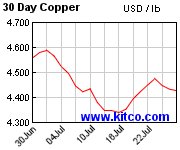
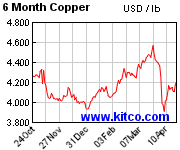
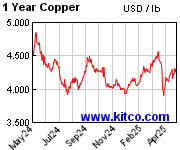
.

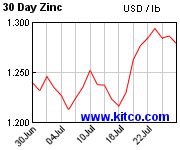
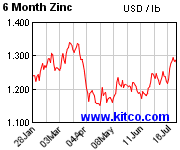
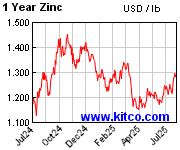
.

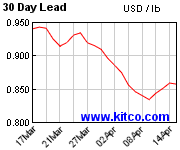
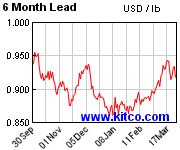
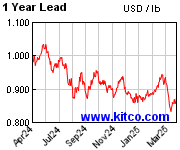
.

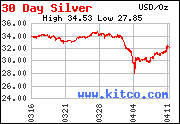
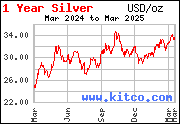
.

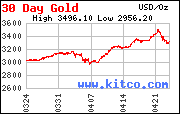
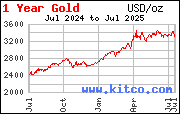
.
.




.




.




.



.



.
- Comodoro
- Mensajes: 980
- Registrado: Jue May 06, 2010 8:24 am
- Ubicación: LIMA
Re: Miercoles 11/07/12 Minutas del Fed
11:39 p.m. EDT 07/10/12Treasurys
Price Chg Yield %
2-Year Note 0/32 0.270
10-Year Note -0/32 1.508
* at close
11:30 p.m. EDT 07/10/12Futures
Last Change Settle
Crude Oil 84.17 0.26 83.91
Gold 1573.4 -6.4 1579.8
E-mini Dow 12569 -16 12585
E-mini S&P 500 1334.75 -0.75 1335.50
11:40 p.m. EDT 07/10/12Currencies
Last (mid) Prior Day †
Japanese Yen (USD/JPY) 79.32 79.43
Euro (EUR/USD) 1.2257 1.2249
† Late Tuesday in New York.
Price Chg Yield %
2-Year Note 0/32 0.270
10-Year Note -0/32 1.508
* at close
11:30 p.m. EDT 07/10/12Futures
Last Change Settle
Crude Oil 84.17 0.26 83.91
Gold 1573.4 -6.4 1579.8
E-mini Dow 12569 -16 12585
E-mini S&P 500 1334.75 -0.75 1335.50
11:40 p.m. EDT 07/10/12Currencies
Last (mid) Prior Day †
Japanese Yen (USD/JPY) 79.32 79.43
Euro (EUR/USD) 1.2257 1.2249
† Late Tuesday in New York.
- admin
- Site Admin
- Mensajes: 165559
- Registrado: Mié Abr 21, 2010 9:02 pm
Re: Miercoles 11/07/12 Minutas del Fed
1:10 a.m. EDT 07/11/12Treasurys
Price Chg Yield %
2-Year Note 0/32 0.270
10-Year Note -1/32 1.510
* at close
1:04 a.m. EDT 07/11/12Futures
Last Change Settle
Crude Oil 84.53 0.62 83.91
Gold 1574.0 -5.8 1579.8
E-mini Dow 12583 -2 12585
E-mini S&P 500 1336.25 0.75 1335.50
1:14 a.m. EDT 07/11/12Currencies
Last (mid) Prior Day †
Japanese Yen (USD/JPY) 79.32 79.43
Euro (EUR/USD) 1.2258 1.2249
† Late Tuesday in New York.
Price Chg Yield %
2-Year Note 0/32 0.270
10-Year Note -1/32 1.510
* at close
1:04 a.m. EDT 07/11/12Futures
Last Change Settle
Crude Oil 84.53 0.62 83.91
Gold 1574.0 -5.8 1579.8
E-mini Dow 12583 -2 12585
E-mini S&P 500 1336.25 0.75 1335.50
1:14 a.m. EDT 07/11/12Currencies
Last (mid) Prior Day †
Japanese Yen (USD/JPY) 79.32 79.43
Euro (EUR/USD) 1.2258 1.2249
† Late Tuesday in New York.
- admin
- Site Admin
- Mensajes: 165559
- Registrado: Mié Abr 21, 2010 9:02 pm
Re: Miercoles 11/07/12 Minutas del Fed
SPANISH Updated July 10, 2012, 5:43 p.m. ET
Cómo hará J.P. Morgan Chase para superar la tormenta
Por DAVID REILLY
No son sólo las cifras de ganancias que informa J.P. Morgan Chase & Co. lo que importa. Es cómo las obtiene.
Todos los ojos estarán puestos en J.P. Morgan cuando anuncie el viernes sus resultados del segundo trimestre y, fundamentalmente, entregue una cuenta más completa de la pérdida por negociaciones que ha abrumado al banco. La primera pregunta será qué tan grande fue la pérdida como consecuencia de un operador apodado "la ballena de Londres". Los mercados esperan entre US$4.000 millones y US$5.000 millones. Lo siguiente es qué herramientas puede usar J.P. Morgan para compensar la pérdida y lo que eso dice sobre la calidad de sus ganancias.
La sede de JP Morgan Chase & Co. en Nueva York
Una opción: vender algunos valores de la cartera cercana a US$360.000 millones administrada por la división que causó el problema de negociaciones. Esta cartera registraba ganancias de US$8.000 millones al final del primer trimestre. Y el presidente ejecutivo James Dimon, al informar las pérdidas en mayo, señaló que el banco también había generado cerca de US$1.000 millones en ganancias por la venta de valores en la cartera.
Sin embargo, cosechar esas ganancias plantea problemas. Podría ser como robarle a Pedro para pagarle a Pablo; el banco vendería valores de alto rendimiento sólo para reemplazarlos por otros de menor rendimiento. Ello podría afectar el rendimiento promedio de 2,6% de la cartera y el margen de interés neto del banco.
Otro punto de alivio potencial podría provenir de la divulgación de las reservas para pérdidas de préstamos, aunque Dimon frecuentemente se ha referido a las ganancias procedentes de esos movimientos como "beneficios de papel".
Luego está el área oscura de los gastos de litigio. Esta es un área compleja y muy poco divulgada que ofrece en apariencia flexibilidad en las ganancias; las empresas no están obligadas a mostrar el monto de estas reservas.
En el segundo trimestre de 2011, por ejemplo, J.P. Morgan sumó US$1.900 millones a su reserva de litigio, según documentos presentados a los reguladores bancarios. De modo que si el banco no necesitó asumir un cargo similar este año o si decidió diferir parte de esa suma uno o dos trimestres, podría aumentar las ganancias en ese mismo monto respecto a igual período del año anterior.
Más aún, es difícil para los inversionistas medir cuánta libertad de acción tiene el banco, o cualquier empresa, con esas reservas. Aunque J.P. Morgan aumentó su reserva para el segundo trimestre de 2011 en US$1.900 millones, su informe de resultados sólo mencionó un cargo de US$1.300 millones para una sección del banco. Y para todo 2011, el banco mencionó US$2.800 millones en gastos de litigio en sus entregas de resultados, mientras que las presentaciones de sus estados financieros mostraron un gasto total de US$4.800 millones.
No hay indicios de que J.P. Morgan use sus reservas de litigio para inflar sus resultados. Pero la posibilidad de que las empresas usen tales reservas como una alcancía es una de las razones por las cuales las normativas de divulgación deberían mejorarse. También sirve como otro recordatorio de porqué los inversionistas tienen tanta dificultad para analizar los resultados de los grandes bancos.
Cómo hará J.P. Morgan Chase para superar la tormenta
Por DAVID REILLY
No son sólo las cifras de ganancias que informa J.P. Morgan Chase & Co. lo que importa. Es cómo las obtiene.
Todos los ojos estarán puestos en J.P. Morgan cuando anuncie el viernes sus resultados del segundo trimestre y, fundamentalmente, entregue una cuenta más completa de la pérdida por negociaciones que ha abrumado al banco. La primera pregunta será qué tan grande fue la pérdida como consecuencia de un operador apodado "la ballena de Londres". Los mercados esperan entre US$4.000 millones y US$5.000 millones. Lo siguiente es qué herramientas puede usar J.P. Morgan para compensar la pérdida y lo que eso dice sobre la calidad de sus ganancias.
La sede de JP Morgan Chase & Co. en Nueva York
Una opción: vender algunos valores de la cartera cercana a US$360.000 millones administrada por la división que causó el problema de negociaciones. Esta cartera registraba ganancias de US$8.000 millones al final del primer trimestre. Y el presidente ejecutivo James Dimon, al informar las pérdidas en mayo, señaló que el banco también había generado cerca de US$1.000 millones en ganancias por la venta de valores en la cartera.
Sin embargo, cosechar esas ganancias plantea problemas. Podría ser como robarle a Pedro para pagarle a Pablo; el banco vendería valores de alto rendimiento sólo para reemplazarlos por otros de menor rendimiento. Ello podría afectar el rendimiento promedio de 2,6% de la cartera y el margen de interés neto del banco.
Otro punto de alivio potencial podría provenir de la divulgación de las reservas para pérdidas de préstamos, aunque Dimon frecuentemente se ha referido a las ganancias procedentes de esos movimientos como "beneficios de papel".
Luego está el área oscura de los gastos de litigio. Esta es un área compleja y muy poco divulgada que ofrece en apariencia flexibilidad en las ganancias; las empresas no están obligadas a mostrar el monto de estas reservas.
En el segundo trimestre de 2011, por ejemplo, J.P. Morgan sumó US$1.900 millones a su reserva de litigio, según documentos presentados a los reguladores bancarios. De modo que si el banco no necesitó asumir un cargo similar este año o si decidió diferir parte de esa suma uno o dos trimestres, podría aumentar las ganancias en ese mismo monto respecto a igual período del año anterior.
Más aún, es difícil para los inversionistas medir cuánta libertad de acción tiene el banco, o cualquier empresa, con esas reservas. Aunque J.P. Morgan aumentó su reserva para el segundo trimestre de 2011 en US$1.900 millones, su informe de resultados sólo mencionó un cargo de US$1.300 millones para una sección del banco. Y para todo 2011, el banco mencionó US$2.800 millones en gastos de litigio en sus entregas de resultados, mientras que las presentaciones de sus estados financieros mostraron un gasto total de US$4.800 millones.
No hay indicios de que J.P. Morgan use sus reservas de litigio para inflar sus resultados. Pero la posibilidad de que las empresas usen tales reservas como una alcancía es una de las razones por las cuales las normativas de divulgación deberían mejorarse. También sirve como otro recordatorio de porqué los inversionistas tienen tanta dificultad para analizar los resultados de los grandes bancos.
- admin
- Site Admin
- Mensajes: 165559
- Registrado: Mié Abr 21, 2010 9:02 pm
¿Quién está conectado?
Usuarios navegando por este Foro: No hay usuarios registrados visitando el Foro y 18 invitados
